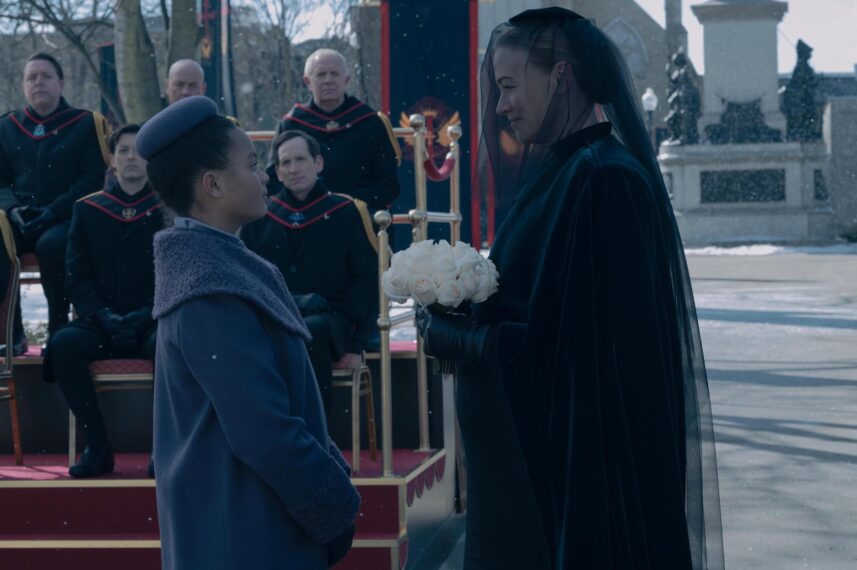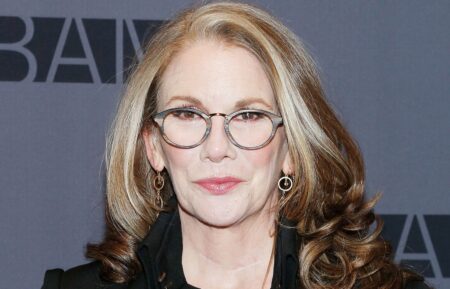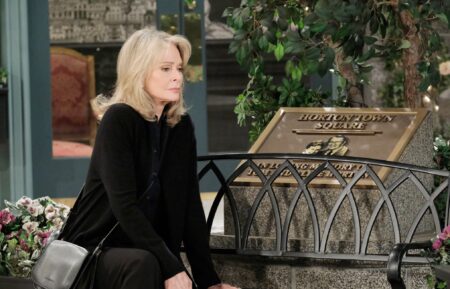‘The Handmaid’s Tale’ Boss on Emily’s Exit, June vs. Serena & More

Spoiler Alert
[Warning: The below contains MAJOR spoilers for the first two episodes of The Handmaid’s Tale Season 5 “Morning” and “Ballet.”]
After a bloody end to The Handmaid’s Tale Season 4 (and Joseph Fiennes’ Fred), the Hulu drama kicks off Season 5 with two emotional hours.
A quick recap: June (Elisabeth Moss) confesses to Fred’s murder, only to find out she won’t face any legal consequences (except a fine for , transporting an unsecured biological sample, his finger) since it didn’t happen in Canada. Serena (Yvonne Strahovski) uses Fred’s funeral to show Gilead off to the world with a televised event, one June and Luke (O-T Fagbenle) see — including that their daughter, Hannah, is present. Plus, June finds out that Emily (Alexis Bledel, who exited between seasons) returned to Gilead to fight. And in Gilead, Esther (Mckenna Grace), after being taken to the Putnams to become their handmaid, poisons herself and Janine (Madeline Brewer).
Here, executive producer Bruce Miller breaks down those key moments.
Looking at the June vs. Serena of it this season, it’s a back-and-forth in these first two episodes: the aftermath of Fred’s murder, the Hannah of it. What did you want to do with that dynamic now that Fred’s out of the picture and there have to be mixed feelings there?
Bruce Miller: Absolutely. I think with the death of Fred, June sees that as the end of something, not realizing that for Serena, it’s the beginning of something. June knows how smart and tough and scary Serena is. It’s just not something she was thinking about. She was putting her focus on Fred and to realize that the death of Fred lights a fire under someone like Serena, who is both not going to wait for you to hit her before she hits you and also not going to let herself be vulnerable, she’s going to build ramparts. For June, it’s not just that she’s realizing that “it wasn’t just Fred who I really would like to wipe off the face of the Earth,” it’s also “I have a dream of killing Serena as well.”
Serena’s defense is an offense. As soon as she killed Fred, Serena was going to do everything she could to get June either powerless or dead or both and you can see why, that for Serena, it’s out of respect. Serena respects June and also June succeeded. She killed Fred. Serena has every reason to believe she could kill her. I think the interesting thing is that Serena was a slight bit ahead of June at this point, so it’s June realizing that Serena — just because Serena is in her sights — is now a danger to her and her family. I like the fact that they respect each other and they respect the creativity of each other’s ways to get what they want. But it also is great they still surprise each other.
Why have there be no legal consequences for June killing Fred? What’s the story you wanted to tell when it comes to the aftermath of that murder for June?
There’s two stories. One is the story of her personally. For me, it would’ve been easier for her — she would be thinking that she was going to get some sort of institutional punishment that would tell her whether she was right or wrong. In Gilead, you always had that. It was terrifying but at least you knew what you could do and what you couldn’t do, so here, I think she assumes, “I’m going to break a law and I’m going to go to jail.” And in this case, it’s the reason she was able to do it because she knew she wouldn’t have to face any of her friends or Luke. She’s going to be in jail for somewhere between five and 15 years, she thinks, and so in some ways, it’s a refuge for her. When she comes out of it, that’s what she’s thinking.

Sophie Giraud/Hulu
I liked the idea that she’s not getting off the hook. No one is saying you can do this and then you’ll be clean. So the first couple episodes are really about how June can’t get clean and nothing that is presented to her seems to be a way to get clean. She goes and says, “I did it, I did it,” and they’re like, OK. It is interesting that June did something that I don’t think anybody would fault her for but June feels like she’s faulting herself and she needs some sort of punishment to put it in perspective and she needs — it would be very nice to have a piece of paper and a person in a robe to tell her, “After you do this, you’ve paid your debt to society.” She doesn’t get that. At the end of the first episode, she said, “I thought I’d be in jail.” That was her next season for her. I think she’s very surprised and also kind of beset with a zillion challenges she thought she would be avoiding.
Talk about coming up with how to write out Emily. Why that way? Will we learn about what’s going on with her in Gilead?
It was a surprise to us that — Alexis had conversations with her people and she made a very kind of careful decision, but I didn’t know we were going to lose her this season so I had planned on having her in the season. Because she’s such an important part of the show, she certainly played an essential role, so we had to pivot to move her out of the show in a way that made sense to the character.
And then I think the way we’ve tried to treat her is very much how they treat people who are still in Gilead or lost in Gilead — June doesn’t talk about Janine ever because you can’t picture Janine. Any picture is awful. So I think it’s like a black hole for their memory, and I think for us, it’s almost like they go over an event horizon, there’s no way to get any information back so why worry because there’s no way to know. That’s where they are in terms of Emily.
Emily, the thing that her wife, the incredible Clea DuVall, says is, we didn’t think we’d have this. We had this time. And I think for a lot of people, that’s the feeling you get after trauma is you have this whole thing. You never thought you’d have a good dinner again, you never thought — and you do, you get something. And I think in this case, for me, that’s what the cautionary tale for Emily is really. The influence on June is that if you’re not careful, you’re going to end up in jail, and if you’re really not careful, you’re going to end up disappearing back into Gilead. Gilead sucks in more ways than one.
Esther and Janine’s stories are both utterly heartbreaking. For Esther, what was the primary driving force behind her poisoning herself and Janine? The situation in general? What Commander Putnam did to Esther? How Esther perceived Janine using her? A combination?
I think it is a combination. I think when Esther tries to kill herself and kill Janine — first of all, I think it’s almost more about killing herself than killing Janine, she wants to take Janine down with her — it’s always about loneliness, that she’s always abandoned by everybody. When I think of her, this little girl at this house, when she was married to Commander Keyes and there’s a luckily nice assistant there, there’s a nice guardian who seems to be taking care of her a little, her whole life seems so lonely.

Sophie Giraud/Hulu
Everybody is nice to her and everybody betrays her. [So] when she thinks she’s being betrayed by Janine, who I think I and you and everybody, including Esther, has the same feelings about: affection that Janine’s looking out for your best interest, that she’s not a selfish woman, that she’s good-hearted and magnanimous and all those kind of things… I think when Janine is trying to explain to her the way the world works and wanting to protect her by not telling her the worst allowed the worst to happen and what it does is it makes her feel more lonely.
I think she’s a desperately lonely kid and that I think is what prompts that furious anger and all that kind of stuff. Because I think once June left, [Esther] sees herself as kind of a mini-me of June and she hasn’t found any way to be June-y at all. It’s, for me, centered around her loneliness.
The Handmaid’s Tale, Wednesdays, Hulu
From TV Guide Magazine
'America's Got Talent': Simon Cowell Teases Big Changes in Season 20 as Mel B. Returns
The show’s judges and host preview the landmark season and reflect on how they’re keeping it fresh. Read the story now on TV Insider.










